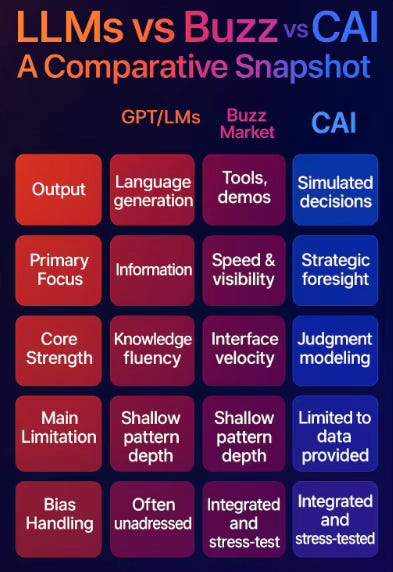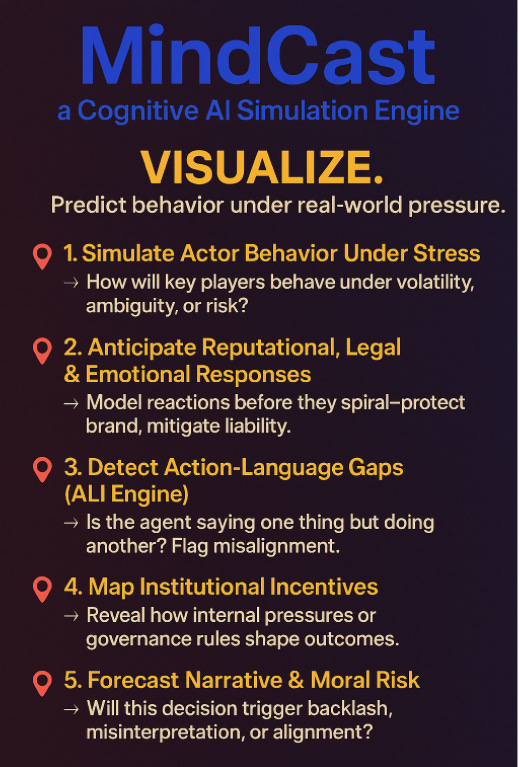MCAI Innovation Vision: Cognitive AI, a New Paradigm
Simulating Judgment Beyond LLMs and the Buzz Market
I. Introduction: The Limits of Generative AI
Artificial Intelligence is advancing fast—but not all systems solve the same problems. Large Language Models (LLMs) like GPT deliver fast, fluid responses. Buzz market startups build innovative tools, experiment quickly, and move ideas into play. These approaches have value—but they don’t simulate how people actually think, assess risk, nor make decisions.
Cognitive Artificial Intelligence (CAI) defines a new category. CAI systems don’t generate language; they simulate judgment. They model how founders, investors, regulators, and institutions behave under uncertainty, pressure, and change. MindCast AI (MCAI) is a Cognitive AI system that moves beyond generative output. It models cognition, simulates decision-making under constraint, and forecasts reputational, strategic, and behavioral outcomes.
While GPTs transform communication and buzz tools optimize interface layers, CAI systems target what comes next: understanding how decisions are made—and how they will unfold. This paper introduces CAI, compares it to other AI categories, and shows how it fills the forecasting gap behavioral economists, institutional leaders, and legal theorists have long identified.
II. Visual Comparison: GPTs vs Buzz Market vs CAI
LLMs focus on language generation and are optimized for fluency, retrieval, and synthesis.
Buzz startups often build traction-focused tools to surface sentiment, metrics, or interaction layers, and stir up buzz.
CAI systems like MCAI simulate judgment and behavior, allowing decision-makers to foresee how real people (or institutions) will act under pressure, across legal, moral, and narrative dimensions.
III. What MCAI Can Do: Capability Highlights
MCAI is not a chatbot or analytics tool. It is a Cognitive AI system designed to simulate the judgment and behavior of human agents. It focuses on outcomes, not outputs. Without relying on prediction based on historical data alone, MCAI uses judgment-first modeling to anticipate real-world behavior.
With MCAI, users can:
• Simulate how key actors will behave under uncertainty or pressure
• Anticipate legal, reputational, and emotional responses before they occur
• Identify when speech and action diverge (Action-Language Integrity)
• Map how institutional incentives influence decision trajectories
• Forecast narrative alignment, moral risk, or social backlash
• Stress-test foresight strategies before implementation
MindCast AI provides organizations with more than insight—it provides simulated foresight.
“MindCast AI is not a chatbot. It’s a judgment simulation engine.”
IV. MCAI as an AI System and a Cognitive AI System
MCAI is both a Cognitive Artificial Intelligence system and a foundational AI system. It integrates a cognitive simulation layer on top of existing AI infrastructure—making it distinct from LLMs, analytics platforms, or interface wrappers. Where other tools optimize expression or presentation, MCAI optimizes cognition itself.
This makes MCAI a hybrid: a cognitive modeling system built on an artificial intelligence engine. It uses AI to process inputs, but its defining function is cognitive judgment modeling—forecasting how agents think, decide, and adapt.
MCAI is patent pending. Its unique framework for simulating cognitive structure, behavior under stress, and decision integrity across legal and strategic domains is protected through provisional intellectual property filings. This ensures its underlying innovation remains both novel and defensible.
V. Use Case: Venture Capital Simulation
A venture capitalist is deciding whether to invest in two AI startups. One has a polished pitch deck and recent media buzz. The other has minimal traction but offers a differentiated product and a founder with deep domain focus.
GPT/LLM: Summarizes both startups, drafts memos, and compares market language. It offers fluency, but lacks depth on behavioral trajectory or risk alignment.
Buzz Tool: Shows dashboards, founder videos, and traction signals. It helps visualize early performance but does not forecast how founders will behave long term.
MCAI: Simulates both founders as Cognitive Digital Twins. It forecasts how each will perform under stress, respond to investor feedback, pivot in adverse markets, and align with the VC’s investment thesis. It highlights long-term compatibility, narrative risk, and behavioral integrity.
Only MCAI shows how judgment, pressure, and narrative will interact.
VI. Bridging Behavioral and Legal Economics
For decades, behavioral economics has mapped how people deviate from rational models—from present bias and loss aversion to framing effects and overconfidence. But while it explained behavior, it lacked a predictive mechanism. MindCast AI changes that.
MCAI introduces a behavioral foresight layer that simulates how people justify decisions, respond to uncertainty, and evolve under institutional, moral, or reputational pressure. By doing so, it delivers the predictive system behavioral economists have long sought.
In doing so, MCAI also bridges behavioral economics and law and economics. The latter has relied on predictive frameworks for decades—from Coasean transaction cost logic to Posnerian efficiency models. Now, MCAI unites these traditions, offering simulation tools grounded in behavioral realism and institutional logic.
Behavioral economists have called for this for years:
Richard Thaler (2015): “We need tools to model how biases play out in real choices.”
Mullainathan & Shafir (2013): Scarcity shapes cognition, but how does that affect forward behavior?
Camerer & Loewenstein (2004): Understanding bounded rationality requires modeling beyond static preferences.
Robert Shiller (2019): Narratives drive economics. We need to model their lifecycle and impact.
MCAI is that next step.
VII. Conclusion & Invitation
LLMs changed how we talk. Buzz tools changed how we interact. Cognitive AI changes how we forecast.
MindCast AI delivers simulation-first foresight. It models behavior before it happens, not just language after it’s spoken. If you’re navigating high-stakes decisions and want to simulate outcomes across legal, emotional, strategic, and reputational lines—let’s talk.
Noel Le
Founder | Architect, MindCast AI LLC
https://www.linkedin.com/in/noelleesq
https://substack.com/@mindcastai







